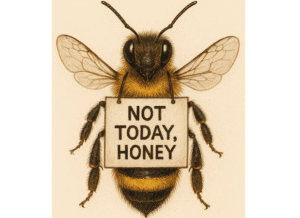Over the past year, lab-made honey has generated serious buzz.
Companies like MeliBio and Israel’s Bee-io are working to recreate honey without bees, using fermentation and plant-based ingredients. MeliBio’s Mellody, for example, is already available — though it’s technically not honey, but a syrup designed to taste like it.
This innovation has raised concerns among traditional beekeepers. In 2024, the World Beekeeping Federation even canceled its annual honey awards over fears of counterfeit and synthetic products, reflecting deep anxiety in the industry.

True lab-grown honey – created through precision fermentation that mimics bee enzymes — is still in early development and not yet available to consumers. So far, what’s on the market are honey alternatives, not scientific replicas.
Proponents point to sustainability: declining bee populations and climate pressures make alternatives attractive. But many producers and consumers still prefer the real thing — valued for its natural origins, health benefits, and authenticity.
Lab-made honey may someday find its place, but for now, it’s more a futuristic promise than a market replacement. Until then, real honey, with all its nuance and variety, remains the gold standard — straight from the hive.
